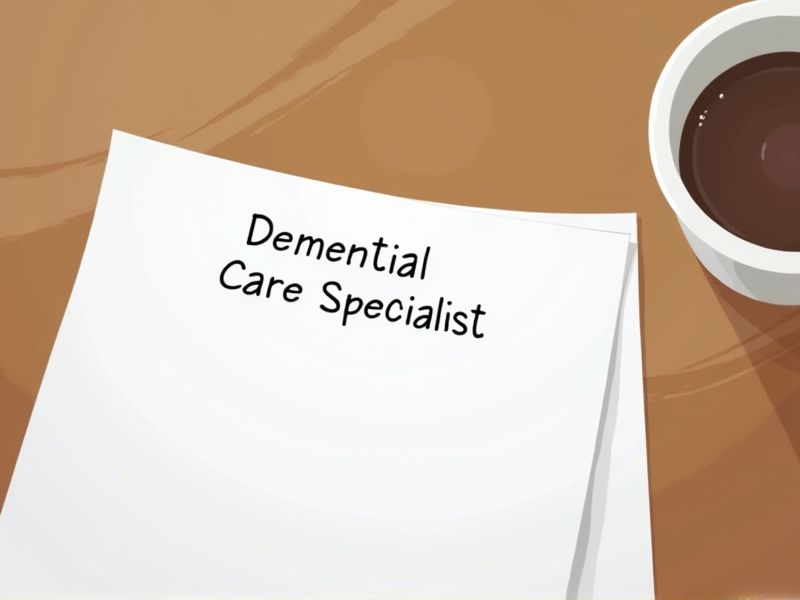
Dementia Care Specialists play a crucial role in enhancing the quality of life for individuals living with dementia. The complexity of dementia symptoms demands a deep understanding of neurological, psychological, and social factors, which certifications can provide. Certification ensures that specialists are equipped with the latest knowledge and skills to manage the intricacies of dementia care effectively. Some vital certifications may be required to excel as a Dementia Care Specialist.
Certified Dementia Practitioner (CDP)
Certified Dementia Practitioner (CDP) enhances the skill set of a Dementia Care Specialist by providing advanced knowledge in dementia care practices. This certification ensures the specialist is updated with best practices and techniques for understanding the complex behaviors associated with dementia. Having a CDP credential increases the trust and confidence of families and patients, as it signifies a recognized standard of excellence in dementia care. Training under the CDP program equips specialists with evidence-based strategies for improving patient quality of life and effective communication.
Alzheimer's and Dementia Care Certification (ADCC)
The Alzheimer's and Dementia Care Certification (ADCC) is vital because it ensures that dementia care specialists possess the necessary skills and knowledge to provide high-quality care tailored to patients with cognitive impairments. The certification leads to better patient outcomes by equipping caregivers with strategies for managing challenging behaviors and enhancing communication. Organizations that employ certified specialists often report improved staff confidence and job satisfaction, which reduces turnover rates. Furthermore, the ADCC aligns with the increasing demand for specialized dementia care as the global aging population continues to grow.
Certified Alzheimer's Care Specialist (CACS)
Certified Alzheimer's Care Specialists (CACS) possess targeted training and expertise in addressing the unique challenges associated with Alzheimer's disease, ensuring improved patient outcomes. Their specialized skills enable them to implement individualized care plans that enhance quality of life for those with dementia. Institutions employing CACS professionals often report better compliance with regulatory standards and a decrease in caregiver burnout. Research indicates that trained Alzheimer's specialists can significantly reduce behavioral issues, leading to a calmer and more stable environment for patients.
Certificate in Person-Centered Dementia Care
A Certificate in Person-Centered Dementia Care equips dementia care specialists with the skills to tailor support to individual needs, enhancing patient engagement. When caregivers apply person-centered approaches, there is often a reduction in challenging behaviors, leading to a more positive care environment. Training in person-centered care fosters improved communication between caregivers and patients, which can strengthen trust and rapport. This certification increases caregiver confidence and competence, which can improve overall care quality and patient outcomes in dementia care settings.
Certified Gerontology Care Manager (CGCM)
Certified Gerontology Care Managers possess specialized knowledge in aging processes, enabling them to understand the complex needs of individuals with dementia. Their expertise aids in developing personalized care plans that enhance quality of life for dementia patients. A CGCM can coordinate multidisciplinary care, ensuring that medical, social, and emotional needs are met in a holistic manner. They serve as a crucial bridge between families, healthcare providers, and patients, reducing caregiver stress and fostering more consistent care environments.
Certification in Memory Care and Dementia Training
Certification in Memory Care and Dementia Training equips dementia care specialists with specific skills to better understand and manage cognitive impairments. This specialized knowledge allows for the development of personalized care plans that enhance the quality of life for individuals with dementia. Proper training reduces the likelihood of care-related mistakes, leading to safer environments for patients. The demand for qualified care specialists increases as the prevalence of dementia rises, making certification essential.
Geriatric Nursing Certification
Obtaining a Geriatric Nursing Certification equips nurses with specialized knowledge in the complexities of aging, crucial for understanding dementia's progression. This certification ensures that practitioners possess the critical skills for developing effective care plans tailored to dementia patients' unique needs. With a growing aging population, certified professionals are essential in delivering evidence-based interventions that improve patients' quality of life. Hospitals and care facilities increasingly seek certified specialists to uphold high standards in dementia care, reflecting the certification's validity and importance.
Certified Senior Advisor (CSA)
A Certified Senior Advisor (CSA) possesses a comprehensive understanding of the aging process, essential for addressing the complex needs of individuals with dementia. This expertise allows a CSA to effectively guide families through the medical, social, and financial challenges associated with dementia care. In this role, they can help craft personalized care plans that enhance quality of life while minimizing stress on caregivers. Knowledge about senior-related resources and systems further enables a CSA to offer practical solutions and support for long-term management of dementia-related issues.
Basic Life Support (BLS) Certification
Basic Life Support (BLS) Certification provides crucial skills for handling emergencies such as cardiac arrest, which can occur in dementia patients. Dementia care specialists with BLS certification can ensure immediate and effective response, potentially reducing fatality rates. BLS certification equips specialists with the knowledge to perform CPR, which could stabilize a patient until advanced medical professionals arrive. Expertise in BLS enhances caregiver confidence, leading to a safer environment for dementia patients.
CPR and First Aid Certification
Dementia care specialists often encounter situations where patients might suffer from sudden health emergencies, necessitating CPR and First Aid knowledge to provide immediate critical support. The progression of dementia can lead to increased physical fragility, making accidents and medical crises more likely; thus, trained response can prevent complications. Certification ensures that specialists are equipped with the skills to stabilize individuals before professional medical help arrives. This knowledge fosters a safe environment for both patients and caregivers by reducing the risks associated with unforeseen health events.
Summary
By attaining certifications, you can enhance your ability to provide specialized care to dementia patients. Certifications can lead to improved patient outcomes due to the application of new techniques and strategies learned. You may also experience increased job satisfaction as you gain confidence and expertise in your field. Moreover, having certifications can strengthen your credibility and job prospects in the healthcare sector.
